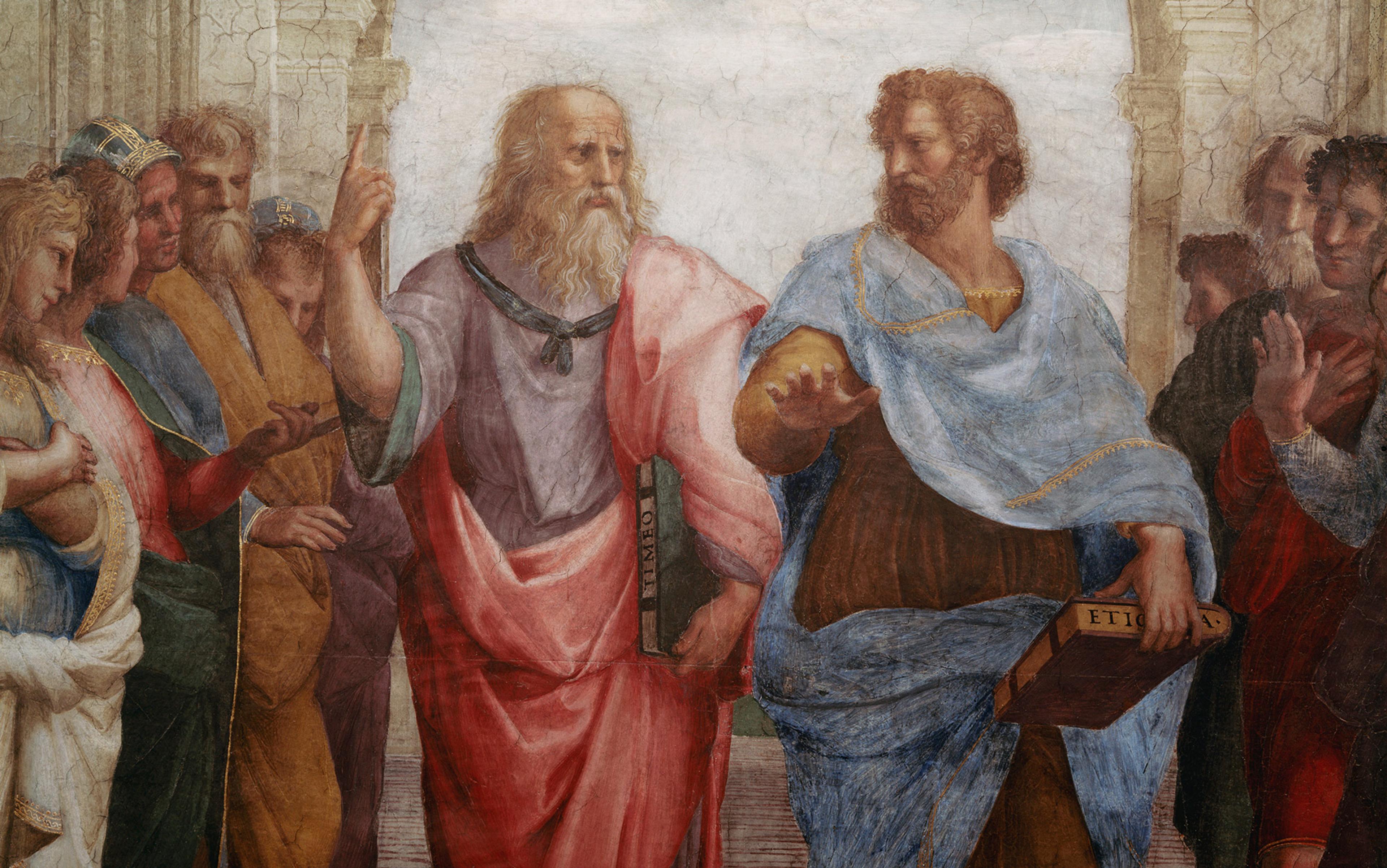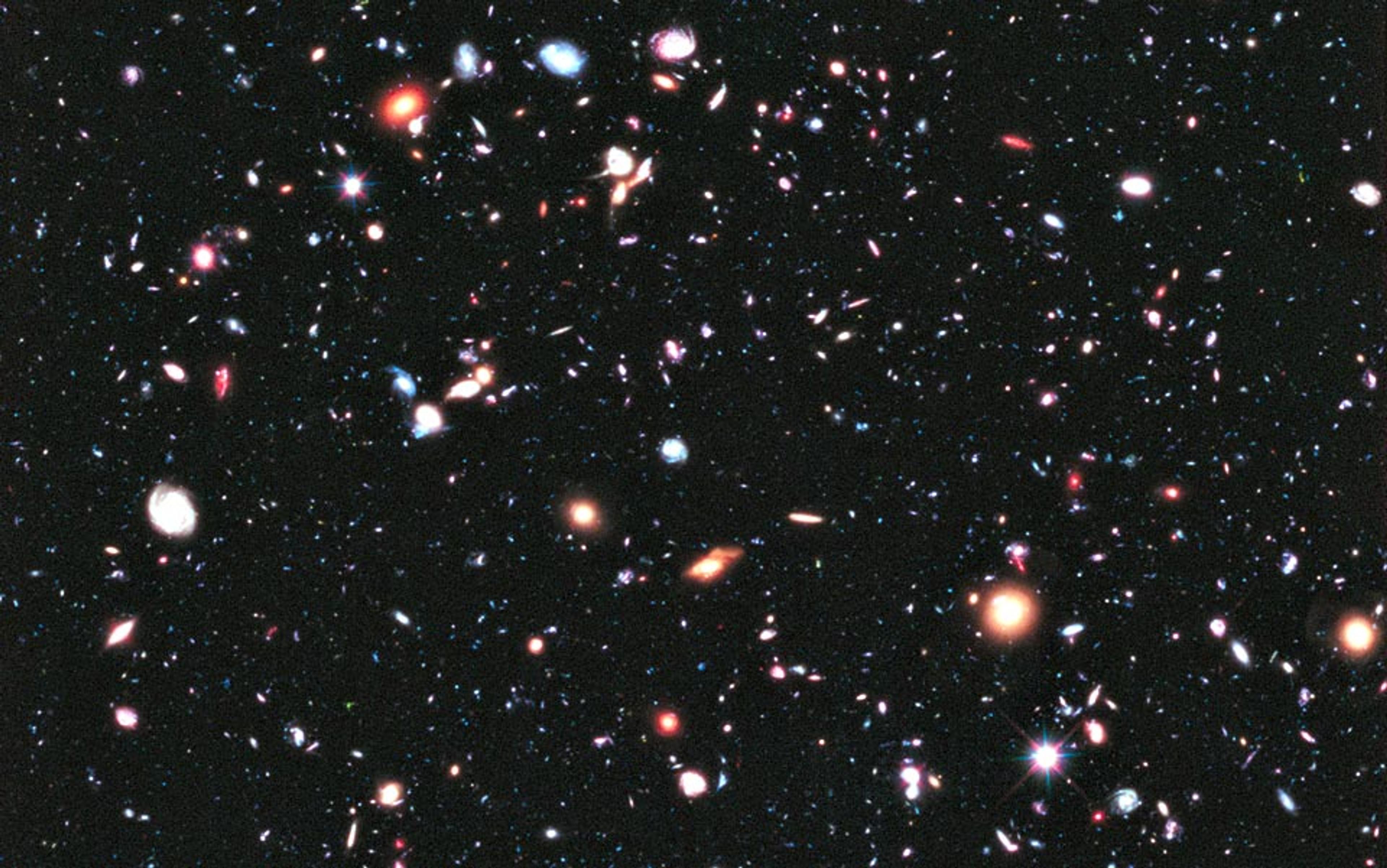Humanity occupies a very small place in an unfathomably vast Universe. Travelling at the speed of light – 671 million miles per hour – it would take us 100,000 years to cross the Milky Way. But we still wouldn’t have gone very far. By recent estimates, the Milky Way is just one of 2 trillion galaxies in the observable Universe, and the region of space that they occupy spans at least 90 billion light-years. If you imagine Earth shrunk down to the size of a single grain of sand, and you imagine the size of that grain of sand relative to the entirety of the Sahara Desert, you are still nowhere near to comprehending how infinitesimally small a position we occupy in space. The American astronomer Carl Sagan put the point vividly in 1994 when discussing the famous ‘Pale Blue Dot’ photograph taken by Voyager 1. Our planet, he said, is nothing more than ‘a mote of dust suspended in a sunbeam’.
And that’s just the spatial dimension. The observable Universe has existed for around 13.8 billion years. If we shrink that span of time down to a single year, with the Big Bang occurring at midnight on 1 January, the first Homo sapiens made an appearance at 22:24 on 31 December. It’s now 23:59:59, as it has been for the past 438 years, and at the rate we’re going it’s entirely possible that we’ll be gone before midnight strikes again. The Universe, on the other hand, might well continue existing forever, for all we know. Sagan could have added, then, that our time on this mote of dust will amount to nothing more than a blip. In the grand scheme of things we are very, very small.
For Sagan, the Pale Blue Dot underscores our responsibility to treat one another with kindness and compassion. But reflection on the vastness of the Universe and our physical and temporal smallness within it often takes on an altogether darker hue. If the Universe is so large, and we are so small and so fleeting, doesn’t it follow that we are utterly insignificant and inconsequential? This thought can be a spur to nihilism. If we are so insignificant, if our existence is so trivial, how could anything we do or are – our successes and failures, our anxiety and sadness and joy, all our busy ambition and toil and endeavour, all that makes up the material of our lives – how could any of that possibly matter? To think of one’s place in the cosmos, as the American philosopher Susan Wolf puts it in ‘The Meanings of Lives’ (2007), is ‘to recognise the possibility of a perspective … from which one’s life is merely gratuitous’.
The sense that we are somehow insignificant seems to be widely felt. The American author John Updike expressed it in 1985 when he wrote of modern science that:
We shrink from what it has to tell us of our perilous and insignificant place in the cosmos … our century’s revelations of unthinkable largeness and unimaginable smallness, of abysmal stretches of geological time when we were nothing, of supernumerary galaxies … of a kind of mad mathematical violence at the heart of the matter have scorched us deeper than we know.
In a similar vein, the French philosopher Blaise Pascal wrote in Pensées (1669):
When I consider the short duration of my life, swallowed up in an eternity before and after, the little space I fill engulfed in the infinite immensity of spaces whereof I know nothing, and which know nothing of me, I am terrified. The eternal silence of these infinite spaces frightens me.
Commenting on this passage in Between Man and Man (1947), the Austrian-Israeli philosopher Martin Buber said that Pascal had experienced the ‘uncanniness of the heavens’, and thereby came to know ‘man’s limitation, his inadequacy, the casualness of his existence’. In the film Monty Python’s The Meaning of Life (1983), John Cleese and Eric Idle conspire to persuade a character, played by Terry Gilliam, to give up his liver for donation. Understandably reluctant, he is eventually won over by a song that sharply details just how comically inconsequential he is in the cosmic frame.
Even the relatively upbeat Sagan wasn’t, in fact, immune to the pessimistic point of view. As well as viewing it as a lesson in the need for collective goodwill, he also argued that the Pale Blue Dot challenges ‘our posturings, our imagined self-importance, and the delusion that we have some privileged position in the Universe’.
The pessimistic view, then, is that, because we occupy such a small and brief place in the cosmos, we and the things we do are insignificant and inconsequential. But is that right? Are we insignificant and inconsequential? And if we are, should we respond with despair and nihilism? These questions are paradigmatically philosophical, but they have received little attention from contemporary philosophers. To the extent that they address the question of whether we are cosmically insignificant at all, they have typically dismissed it as confused.
The English moral philosopher Bernard Williams is representative of the dismissers. As he understands it, having significance from the cosmic point of view is the same thing as having objective value. Something has objective value when it is not only valuable to some person or other, but valuable independently of whether anyone judges it to be so – valuable, Williams might say, from a universal perspective. By contrast, something can be subjectively valuable even if it is not objectively valuable. Provided that someone finds a thing valuable, then it has subjective value to them, though not necessarily to the rest of us. Williams takes it to be a consequence of a naturalistic, atheistic worldview that nothing has objective value. In his posthumous essay ‘The Human Prejudice’ (2006), he argues that the only kind of value that exists is the subjective kind. I value Mozart’s Requiem. Maybe you do too. But even so, Williams would say, it is valuable only insofar as we judge it to be. Its value is not an independent fact lying out there, beyond the reach of our opinions, waiting to be uncovered.
Since, according to Williams, to be significant from the cosmic point of view is to be objectively valuable, and there is no such thing as objective value, it follows that there is no such thing as cosmic significance. The very idea, he argues, is ‘a relic of a world not yet thoroughly disenchanted’. In other words, of a world that still believes in the existence of God. Once we recognise that there is no such thing, he says, there is ‘no other point of view except ours in which our activities can have or lack a significance’. The question of what is significant from the point of view of the cosmos is incoherent: one might as well ask what is significant from the point of view of a pile of rocks. The philosopher Simon Blackburn at the University of Cambridge puts it even more bluntly in Being Good (2001). When we ask if human life has meaning or significance, he simply responds: ‘To whom?’
Is the whole worry about cosmic insignificance nothing more than a muddle then? Guy Kahane at the University of Oxford is one of the few contemporary philosophers to have written about these issues in detail. He disagrees. In ‘Our Cosmic Insignificance’ (2013) he points out that if the naturalistic worldview does indeed rule out the possibility of anything having objective value, then it would still do so if the Universe were the size of a matchbox, or came into existence only moments ago. If, on the other hand, there is such a thing as objective value, then it would exist no less in an infinitely large, old and silent universe. Matters of cosmological size and scale don’t even come into the equation. Kahane thinks this is obvious. But if so, is it really plausible that we are making such an elementary error? Or is it more likely that there is something else driving our sense of cosmic insignificance?
If we are the sole exemplars of intelligent life, then we are of immense cosmic significance
Kahane thinks that there is a better way of thinking about the matter. He disputes Williams’s claim that nothing has objective value: intelligent life, he argues, has it in spades (and little else comes close). But more importantly, the dismissers have misunderstood what it means for something to be significant or insignificant. Kahane argues that the significance of something is the product of two things: how valuable (or disvaluable) it is, but also how worthy it is of attention. As he points out, when one’s frame of reference expands to encompass more and more, the attention-worthiness of something within it, and so that thing’s significance within the frame of reference, tends to decrease. What’s significant from the point of view of your life – the birth of your child, perhaps – might be less significant, less noteworthy, from the point of view of the town you live in. And what’s significant from the point of view of the town you live in – the closure of the local hospital, let’s say – might be relatively insignificant from the point of view of the entire country. What’s significant from the point of view of the country could, in turn, merit little attention from the point of view of the entire world.
The cosmic point of view encompasses literally everything in the Universe: the entirety of space and time, from edge to edge, and beginning to end. From that point of view, we are nothing more than a microscopic blip, physically and temporally speaking at least. And this, Kahane argues, is what gives rise to our sense of insignificance. Since the cosmic point of view encompasses so much, and the significance of things tends to diminish as the frame of reference expands, it is natural to think that we couldn’t possibly stand out as worthy of special attention within it; there is simply too much to compete with. If not, we conclude, then we must be insignificant.
But, Kahane argues, this is all too quick. We mustn’t forget that significance is also a function of value. If, for some reason, human life stands out as a source of value compared with everything else, then even from the cosmic point of view we might be significant. A single diamond sitting on display in a huge empty warehouse might be small by comparison with its surroundings, but that doesn’t mean that it’s insignificant or that it merits no attention. Since, Kahane argues, the primary source of value is intelligent life, it follows that our cosmic significance depends on how much intelligent life there is out there. If the Universe is teeming with it, if we are just one diamond among millions or billions of others, many of which are just as large and bright, or more so, then we are indeed cosmically insignificant. If, however, we are the sole exemplars of intelligent life, then we are of immense cosmic significance: we are a single diamond shining forth, surrounded by nothingness, like an incandescent beacon of light in the Stygian night. The rub, of course, is that we currently cannot tell: we don’t know what, or rather who, we share the cosmos with.
Kahane’s view, then, is that intelligent life is the primary source of value, and since only that which has value is significant, whether or not we matter depends on the quantity of intelligent life in the Universe. If it is abundant, then we are insignificant and matter little. But if we alone exemplify it, then we are of immense significance even from the supremely broad perspective of the entire Universe.
Is that right? I think that, like Williams and the dismissers, Kahane has misdiagnosed the issue. It is a striking fact that none of the passages quoted earlier expressing the idea that we are cosmically insignificant makes any reference to the possibility that we are only one among many communities of intelligent life spread throughout the Universe. If that was the crux of the matter, wouldn’t we at least expect it to be mentioned? In fact, wouldn’t we expect it to be front and centre? Yet it is nowhere. Not in the passages quoted, nor, as far as I know, anywhere else. Instead, what we find are evocative descriptions of the minute location we occupy in space and the disheartening brevity of our temporal span. Worse still, when considering the possibilities that Kahane describes for our significance, it is easy to remain unmoved. Speaking for myself, insofar as reflection on our tiny place in the Universe leads me to the feeling that we are unimportant and that nothing we do matters, that feeling remains unwavering whether or not I imagine a universe full of life, or a vast barren wasteland. In fact, if anything, things get worse when I contemplate the second possibility. I suspect I am not alone in feeling this way.
A better diagnosis might be that when we reflect on our place in the Universe we find ourselves wanting on an altogether different scale of significance. To see what I have in mind, notice that something can be significant while being neither valuable nor disvaluable. Suppose that a group of meteorologists is trying to establish whether a rapidly developing tropical storm will turn into a hurricane before it hits land. There is, it transpires, a large body of moist warm air 50 miles offshore, into which the storm will shortly collide. Moist warm air tends to intensify tropical storms. As a result, upon learning of its presence, the meteorologists conclude that the storm will indeed turn into a hurricane. This, let’s suppose, is exactly what happens. When explaining events to the public, it would be perfectly natural for the meteorologists to say that the formation of the body of air was significant in the chain of events that led to the storm turning into a hurricane. But there need not be any suggestion of value or disvalue here. The body of air, and, we may suppose, the hurricane itself, had no positive or negative value whatsoever. Only that which affects intelligent life has value or disvalue – or at least, only that which affects sentient life, if we want to include other species – and the land where the hurricane hit was wholly unpopulated; no human or animal concerns were affected. The body of air was significant, yet it doesn’t register anywhere on the value scale.
In what sense was it significant then? The obvious answer is that it was causally significant in virtue of being one of the main causes of the storm turning into a hurricane. Clearly, causal significance needn’t involve value. The causal significance of something is the result of the degree of influence it has within a causal chain. The more influence it has, the more significant it is. The less influence it has, the less significant it is. The presence of moist warm air offshore was significant because it played an important role in the tropical storm developing into a hurricane. Perhaps, unrelatedly, a forest fire started on the other side of the world at the same time. If so, that fact was not significant – at least for the meteorologists – since it made no difference whatsoever to the chain of events that they were interested in.
I think that, contra Kahane, it is a sense of causal, rather than value, insignificance that is central to the sense that we are cosmically insignificant. Recognition of the tiny place we occupy in the Universe throws a stark light on our distinct lack of causal power. Those of us who are thoroughly disenchanted know that almost all of space is completely beyond our control, and that, living on no more than a mote of dust, we will be borne away by the slightest breeze that happens to drift our way. Worse still, we know that once we have been snuffed out, the Universe will continue to roll on as though nothing had happened. Causally speaking, we really are insignificant from the point of view of the whole Universe.
Why think that it’s the comprehension of our causal insignificance that drives the pessimistic line of thought? Well, for one thing, it makes sense of the fact that our sense of insignificance can easily remain unshaken upon considering the possibility that we are alone in the Universe. Whether the Universe is teeming with intelligent life, or almost wholly barren, makes no difference whatsoever to our degree of causal influence within it. But more importantly, the primary source of our concern regarding our cosmic insignificance is, it seems, that we occupy a very small place in the Universe. Given this, it presumably makes sense to think that, were we not so small, we would correspondingly not feel so insignificant.
Suppose that we could bend and warp the course of the Universe: probably we’d feel rather pleased with ourselves
The causal-powers explanation (as we might call it) makes sense of this. Holding fixed our causal powers as they actually are, the smaller the Universe is, the greater our size and the degree of our causal influence within it; and the larger the Universe, the smaller our size and the lesser our degree of causal influence. This might explain why the sense that we are cosmically insignificant is a largely modern phenomenon. With a few exceptions, most of our predecessors had no inkling of the coming revelations of astronomy, and believed that the Earth was at the centre of a rather small universe. There is little evidence that they felt insignificant in the way that we are liable to. If the causal-powers explanation is correct, this should come as no surprise: they might have seen themselves as wielding a considerable degree of causal power.
The causal-powers explanation also makes sense of a related hypothetical scenario. Suppose that, rather than imagining a situation in which our causal powers are held fixed and the size of the Universe is altered, we instead hold fixed the size of the Universe as it actually is, and instead imaginatively alter our causal powers. Suppose, then, that we were to have control over the trajectory of distant stars, and the future of far-flung galaxies; that we could bend and warp the course of the Universe to fit our purposes, and so on. Would we still feel cosmically insignificant? I doubt it. Probably we would feel rather pleased with ourselves.
The causal-powers explanation might also explain at least some of the appeal of theism. Religious believers sometimes say that their faith gives significance to their lives, and fear that a life without God would be meaningless. One way in which this might seem to be true – though presumably this is not all they have in mind – is that through allegiance to a supremely powerful being they are able to share in its power. If it worked, prayer would open the door to the possibility of causal powers far out-stripping those we can effect in the corporeal realm.
Still, for the disenchanted, it is hard to deny that our causal powers are insignificant from the point of view of the entire Universe. But should we be troubled by this? Should it lead us to nihilism and despair? I don’t think so. To see why, we need to go back to the issue of value and draw another distinction. Some of the things that we care about – happiness and human flourishing, for example – are intrinsically valuable to us. That is to say, we find them to be valuable in themselves. That doesn’t necessarily mean that they’re objectively valuable. Maybe they are, maybe they’re not (we need not go along with Williams and Kahane in taking a stand on that matter). What it does mean, however, is that we value them for their own sake. But not everything that has value is intrinsically valuable. Some things are only instrumentally valuable – valuable only as a means to an end. Cash, for example, doesn’t have any intrinsic value – it’s just paper with ink printed on it – but it is instrumentally valuable, since you can use it to acquire other things of value. Perhaps not happiness, if the cliché is to be believed, but comfort at least.
We tend to treat power as though it is intrinsically valuable. We seek it out and covet it, quite irrespective of how we might wield it and what it might get us. One need only look at the history of totalitarian politics to recognise this tendency in its most grotesque form. But power isn’t intrinsically valuable, it’s only instrumentally valuable – valuable as a means to an end. And whether or not they are objectively valuable, the ends that matter to us, the things that we care about most – our relationships, our projects and goals, our shared experiences, social justice, the pursuit of knowledge, the creation and appreciation of art, music and literature, and the future and fate of ours and other species – do not depend to any considerable extent on our having control over a vast but largely irrelevant Universe. We might be distinctly lacking in power from the cosmic perspective, and so, in a sense, insignificant. But having such power and such significance wouldn’t make much of a difference anyway. To lament its lack and respond with despair and nihilism is merely a form of narcissism. Most of what matters to us is right here on Earth.






